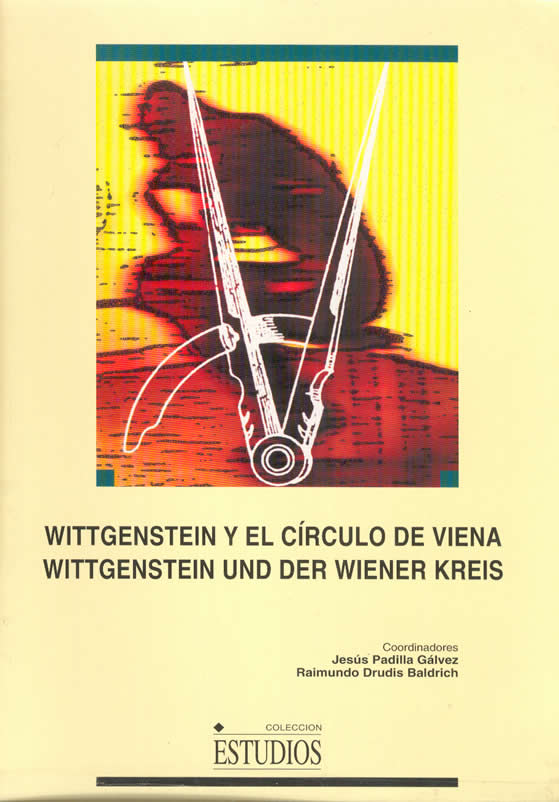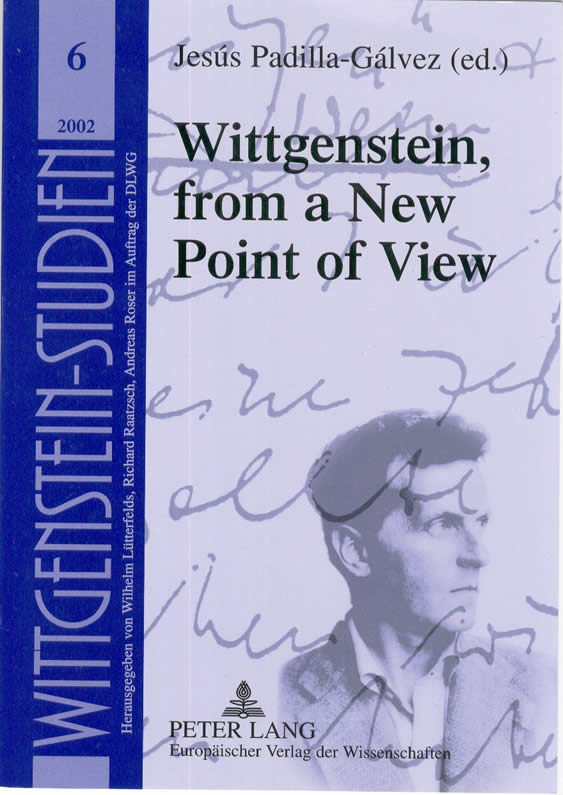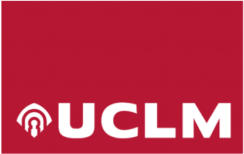
Idealism and Analytical Philosophy
Idealismus und analytische Philosophie
Idealismo y Filosofía Analítica
International Wittgenstein Congress
Thursday, 15 September to Saturday, 17 September 2005
University of Castilla-La Mancha
Facultad de Ciencias Jurídicas y Sociales
San Pedro Mártir, s/n.
E-45071 Toledo
( SPAIN )
Invited Speakers
Invited Speakers include:
- Prof. Dr. Wilhelm Lütterfelds (Universität Passau)
- Prof. Dr. Wilhelm Vossenkuhl (Universität München)
- Prof. Dr. Pirmin Stekeler-Weithofer (Universität Leipzig)
- Prof. Dr. Hans-Johann Glock (University of Reading)
- Profa. Dra. María Cerezo (Universidad de Navarra)
- Prof. Dr. Mirko Wischke (Palackýs University Olmütz)
- Prof. Dr. Alejandro Tomasini Bassols (UNAM)
- Prof. Dr. Pavo Barišić (University Zagreb)
- P.D. Dr. Richard Raatzsch (Universität Leipzig)
- P.D. Dr. Andreas Roser (Universität Passau)
Organization and Scientific Direction
Prof. Dr. Jesús Padilla Gálvez
Universidad de Castilla-La Mancha<
Facultad de Ciencias Jurídicas y Sociales
Cobertizo San Pedro Mártir, s/n.
E-45071 – Toledo (Spain)
Phone:00 34 925 268800 (Extensión: 5126)
Fax: 00 34 925 268832
E-mail: jesus.padilla@uclm.es
Justification
Uno de los fenómenos menos estudiados sistemáticamente en los últimos años tiene que ver con el replanteamiento de cuestiones metafísicas en el seno de la tradición analítica. Esto resulta, ciertamente, paradójico ya que el origen de la filosofía analítica se centra en una crítica a cualquier postulado metafísico en la nueva brecha que se había marcado la filosofía. Como es sabido, el origen de la corriente analítica hecha sus raíces en dos corrientes bien estructuradas: por un lado, el formalismo lógico de G. Frege que somete el planteamiento filosófico al tribunal lógico-formal; por otro lado, surgió de una corriente filosófica denominada el Círculo de Viena que postulaba un empirismo más o menos radical según los integrantes de dicha corriente.
Desde un principio estuvo entroncado a ambas corrientes la obra de Ludwig Wittgenstein. Tanto en su época temprana alrededor del Tractatus lógico-philosophicus [1921 / 1922] así como su trabajo tardío vinculado a las Investigaciones Filosóficas [1958] que plantearon y discutieron temas afines a los problemas metafísicos y ontológicos. Entre ambos trabajos hay un largo paréntesis en la que se sitúa, sin lugar a dudas, como una obra capital el denominado Big Typescript [1933 / 2000] en el que se dedica un extenso capítulo al idealismo.
La relación entre filosofía analítica y el idealismo fue, por tanto, un tema relevante al inicio de la obra wittgensteiniana y resulta importante anota que se concede especial mención en su obra intermedia. El congreso se propone arrojar cierta luz sobre los puntos anejos al idealismo. Dicho capítulo indaga incertidumbres ligadas a la representación de la percepción inmediata; la experiencia del momento actual; se analizan los predicados como “tener un dolor”; el dilema que generan los deícticos; las dificultades que causan los colores, la experiencia y un largo etcétera de temas tratados a lo largo de esta obra.
Deadlines
- 30 June 2005: Deadline for submitted papers and payment for speakers.
- 30 July 2005: Information concerning acceptance / non-acceptance of the submitted papers.
- 30 July 2005: Deadline for registration and payment for non-speakers.
- 15 September 2005: Beginning of the Symposium.
Instructions for Authors of Submitted Papers
Papers should be submitted in Word format and sent as e-mail attachment to:
They may alternatively be sent by mail on disk – including a hard-copy printout – to:
Prof. Dr. Jesús Padilla Gálvez
Universidad de Castilla-La Mancha
Facultad de Ciencias Jurídicas y Sociales
Cobertizo San Pedro Mártir, s/n.
E-45071 – Toledo (Spain)
Languages & Copyright: Papers must be written in Spanish, German or English. They must not have been accepted or submitted for publication elsewhere. Copyright will remain with the author.
Length: Papers should include a short abstract (max. 150 words). Papers should not exceed an overall length of 3000 words, including all notes, references, and the abstract.
Layout: Authors should use a simple uniform layout. They should avoid mixing fonts, and they should use italics (not bold) for words or phrases requiring emphasis, for titles of published books and journals, and for foreign words.
Headings: A maximum of one level of section headings should be used, with the following format:
2. Wittgenstein’s Theory of Colour.
References: A bibliographical list of all cited references should be placed at the end of the paper under the heading “Bibliografía”, “Literature (References)” or “Literatur”. It should begin with the author’s last name, first name and followed by the year of publication, exactly according to the following style:
- Wittgenstein, L., 1980: Tractatus logico–philosophicus. Tagebücher.Philosophische Untersuchungen. In: Schriften 1. Suhrkamp, Frankfurt a. M.
- Frege, G., 1892: Über Sinn und Bedeutung, Zeitschrift für Philosophie und philosophische Kritik, 100, 25-50.
- Sluga, H., Stern, D. G. (eds.), 1996: The Cambridge Companion to Wittgenstein. Cambridge U.P., Cambridge.
- Padilla Gálvez, J., 2004: Disgressionen über das sich entwerfende Ich. In: Thomas Mohrs, Adreas Roser und Djavid Salehi (eds.), Die Wiederkehr des Idealismus? Festschrift für Wilhelm Lütterfelds zum 60. Geburtstag. Peter Lang, Frankfurt a.M.; Berlin; Bern; Bruxelles; New York; Oxford; Wien, 137-153.
All citations should then appear in the text (rather than in footnotes) in the form: (Wittgenstein 1980, 178), (Frege 1892, 25), (Sluga 1996, 24) or (Padilla Gálvez 2004, 138).
Further suggestions:
Avoid footnotes as far as possible.
Avoid automatically generated lists.
Authors will receive one proof. There is possibility for making corrections after submission. Contributions with serious formal or technical faults will be refused.
Registration
If you wish to register, please download the registration form, make a printout, fill it in and send it to:
Prof. Dr. Jesús Padilla Gálvez
Universidad de Castilla-La Mancha
Facultad de Ciencias Jurídicas y Sociales
Cobertizo San Pedro Mártir, s/n.
E-45071 – Toledo (Spain)
Phone: 00 34 925 268800 (Extensión: 5126)
Fax: 00 34 925 268832
E-mail: jesus.padilla@uclm.es
Download the Registration form (.doc) | Download the Registration form (.pdf)
Programa / Program / Programm
Jueves, 15 de septiembre
- 12:00 – 13:30 – Apertura / Opening / Eröffnung
- Wilhelm Lütterfelds (Universität Passau)
- Der Baum und seine Vorstellung. Das Idealismusproblem in „The Big Typescript“
- 14:00 – 16:00 – Almuerzo / Lunch / Mittagsessen
- 16:00 – 16:45 – Pirmin Stekeler-Weithofer (Universität Leipzig)
- Die Kritik am empirischen Idealismus bei Wittgenstein und Hegel
- 16:45 – 17:30 – Alejandro Tomasini Bassols (Universidad Nacional Autónoma de México)
- Analytical Philosophy, Idealism and Wittgenstein’s Tractatus
- 17:30 – 18:00 – Pausa / Coffee break / Kaffeepause
- 18:00 – 18:45 – Eric Lemaire (Archives Poincaré Université de Paris VII)
- Object: analysis or construction?
- 18:45 – 19:30 – Noemí Calabuig Cañestro (Universidad de Valencia)
- La relación entre lógica y ontología en el Tractatus
- 21:30 – 23:00 – Cena / Dinner / Abendessen
Viernes, 16 de septiembre
- 10:00 – 10:45 – Hans-Johann Glock (University of Reading)
- Analytic Philosophy and Idealism
- 10:45 – 11:30 – Cristina Corredor (Universidad de Valladolid)
- Wittgenstein, Idealism and Truth
- 11:30 – 12:00 – Pausa / Coffee break / Kaffeepause
- 12:00 – 13:00 – Mirko Wischke (Palackýs University Olmütz)
- Im Schatten der Begriffe. Wittgenstein und Hegel über Sprache und Erfahrung
- 13:00 – 14:00 – Sabine Knabenschuh de Porta (Universidad del Zulia, Maracaibo)
- Grammatik als Erfahrungsprinzip: Wittgensteins lebensweltlicher Holismus
- 14:00 – 16:00 – Almuerzo / Lunch / Mittagsessen
- 16:00 – 16:45 – John Hyman (Oxford University)
- Wittgenstein on Action and the Will
- 16:45 – 17:30 – Andreas Roser (Universität Passau)
- Der Stein von Rosetta – Grammatische Probleme der Sprachspiel-Synchronisation
- 17:30 – 18:00 – Pausa / Coffee break / Kaffeepause
- 18:00 – 18:30 – José María Ariso Salgado(Universität Leipzig / UCM)
- In welchem Sinne verweigert der Idealismus dem Leben die Ernsthaftigkeit?
- 18:30 – 19:00 – Bazzocchi Luciano (Università di Pisa)
- Hypertextual Interpretation of the Decimals and Architectonic Hermeneutics of Wittgenstein’s Tractatus
- 21:30 – 23:00 – Cena / Dinner / Abendessen
Sábado, 17 de septiembre
- 10:00 – 10:45 – Richard Raatzsch (Universität Leipzig)
- Der Begriff des formalen Begriffs in Wittgensteins „Big Typescript“
- 10:45 – 11:30 – María Cerezo (Universidad de Navarra)
- “Unsinn” and “Erläuterung” as Analogical Terms in the Tractatus
- 11:30 – 12:15 – Jesús Padilla Gálvez (Universidad de Castilla-La Mancha)
- Das Wahre am Idealismus und dessen Missbrauch
- 12:15 – 12:30 – Clausura – Ende – Closure
- 14:00 – 16:00 – Almuerzo / Lunch / Mittagsessen
- 21:30 – 23:00 – Cena / Dinner / Abendessen
Publication
Since 1998, Ediciones de la Universidad de Castilla-La Mancha, Cuenca (http://www.uclm.es/publicaciones) has published the following books:

Wittgenstein y el Círculo de Viena / Wittgenstein und der Wiener Kreis. (Coordinadores: Jesús Padilla Gálvez / Raimundo Drudis Baldrich). Ediciones de la Universidad de Castilla-La Mancha, Cuenca, 1998.

The Deutsche Ludwig Wittgenstein Gesellschaft e.V., Passau, has published the Wittgenstien-Studien (http://www.phil.uni-passau.de/dlwg/). Most papers are in English and German.
Jesús Padilla Gálvez (Ed.), Wittgenstein, from a New Point of View. Wittgenstein-Studien. Lang,Frankfurt a.M.; Berlin; Bern; Bruxelles; New York; Oxford; Wien, 2003.
Sponsors of the International Wittgenstein Symposium
The following institutions support the International Wittgenstein Symposium in Toledo:
- Facultad de Ciencias Jurídicas y Sociales, Toledo (Spain)
- Universidad de Castilla-La Mancha, Toledo (Spain)
- Junta de Comunidades de Castilla-La Mancha, Toledo (Spain)
- Ministerio de Educación y Ciencia, Madrid (Spain)
- Embajada de Alemania in Madrid (Spain)
- Alexander von Humbold Stiftung, Bonn (Germany)
- Ludwig Wittgenstein Gesellschaft e.V. Leipzig (Germany)
Travel and Accommodation
Map of Toledo (Spain)
Travel
- How to get to Toledo by train:
(1) When you arrive in Madrid Airport Barajas, take a metro or taxi to Madrid Atocha (Madrid South railway station). (http://www.renfe.es)
(2) From Madrid Atocha take a train to Toledo, which is situated about 75 kilometres (47 miles) south of Madrid. Trains to Toledo depart almost every hour.
(3) Once you have arrived at the railway station in Toledo, take a taxi to the Faculty of Law and Social Sciences (in San Pedro Mártir), where the conference office is located. The conference office will be open on Thursdy, 15 September from 10.00 am. There you will receive a conference folder.
- How to get to Toledo by bus:
(1) Go to the central bus station in Madrid and take the bus to Toledo There are buses every half an hour, some of them going directly to Toledo. Please contact the following e-mail address for more information(estacionbus@ayto-toledo.org).
Accommodation
- Oficina de Turismo Toledo Plaza del Ayuntamiento, nº 1 45002 Toledo, Toledo Email: turitoledo@line-pro.es Tel: + 34 925 254 030 Fax: + 34 925 254 030
- Oficina de Turismo Toledo Puerta de Bisagra, s/n 45003 Toledo, Toledo Tel: + 34 925 220 843 Fax: + 34 925 252 648
Eating and Drinking
Although vegetarianism is less popular in Spain than in the UK or in the USA, most of the restaurants offer salad. If the menu has no special vegetarian section, consult the starters section. The Primer plato (starters) section should contain salads; the Segundo plato (main dish) usually contains fish or meat and the postre (dessert) usually include ice cream, fruit or cheese.
In Castilla (Spain), the most popular drinks are wine and beer. There is also an ample choice of non-alcoholic beverages.
It is customary to give a tip of 5 to 10 percent of the bill, provided that you are satisfied with service, food and drink.
Money
In a city like Toledo, most people prefer cash to credit cards. So please be prepared to pay your bills in cash, using Euro. There are many banks in Toledo, where you can change money (from Monday to Friday), if necessary. Additionally, all of these banks operate Cash points that accept most of the internationally recognized credit cards.
Weather
September is normally hot and dry, but there may be rain showers, and late evenings and early mornings are chilly.
Links
- Renfe (Online timetable of the Spanish Railways http://www.renfe.es)
- Madrid-Barajas (Madrid International Airport)
- Toledo (turitoledo@line-pro.es)
- Universidad de Castilla-La Mancha (http://www.uclm.es)
Exhibition
During the Symposium the Central Library of the University of Castilla-La Mancha will exhibit a range of books, articles, etc. on Wittgensteins life and works.
